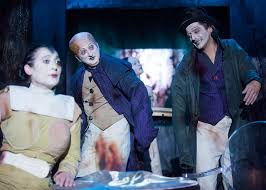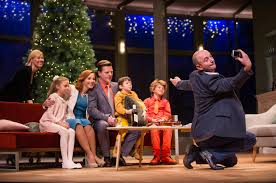Two productions of Ibsen’s revolutionary play at Katona József Színház and Stúdio K
When Henrik Ibsen’s A Doll’s House premiered in 1879, it was a revolutionary treatment of sexual relations (at that time, often referred to as “the woman question”). One critic called the point at which Nora leaves her husband and her children “the door slam heard round the world.” Evidently, the work’s impact continues to be felt. As the fight for sexual equality spreads to new battlefields, A Doll’s House may appear more topical than ever. Yet, how can we keep it fresh and relevant after nearly 140 years?
Let us look first at the attempt by Budapest’s Katona József Theatre, Nóra – karácsony Helmeréknél (Nora – Christmas at the Helmers). As G. B. Shaw claimed, with A Doll’s House, Ibsen was determined to present the audience with a couple that they recognized as one of their own. In this sense, the Katona production is absolutely faithful. Ernő Fekete and Eszter Ónodi are the picture perfect model of synthetic, upwardly-mobile gentility. Talented young director Kriszta Székely shows no patience for the naturalistic slow build of the original. She has her characters deliver important lines, chorus-like, in quick succession before we are dropped into the Helmers’ home on Christmas Eve in the thick of the plot. Some of the shuffling and alterations here are justified, even welcome; yet, like many a young director’s work, it all becomes too much at some point. With all the tinkering, the basic series of events loses its context and dramatic tension. Nora’s Tarantella dance, which symbolized her frustrated attempts at liberation in the original, is replaced by Eszter Ónodi’s wild rendition of Jefferson Airplane’s “Don’t You Want Somebody to Love?” This neither distracts her husband from his work (where he would find Krogstad’s damning letter that incriminates Nora for forgery) nor expresses her inner torment; it merely establishes a mood and hints at some broader theme.
With such talented actors, there are moments that resonate like never before – like when Nora awaits her husband’s reaction to the dreaded news, or when she divulges the self-imposed death of a family friend (Dr. Rank, played by Tibor Kocsis). Réka Pelsőczy and Tamás Keresztes are also effective as Kristine and Krogstad. Rarely has the parallel to Nora and Torvald’s relationship seemed so clear. The later is on the verge of destruction, the former faces the potential of rebirth. This shifts the focus away from sexual politics to the conflict-ridden nature of relationships in general.
Ultimately, though, all the modernization threatens to render meaningless the original shock ending. First of all, Nora is receptive to her husband’s sexual advances in the third act (he, meanwhile, revels in the fleeting opportunity of a three-way with Kristine). Their marriage does not seem so debilitatingly bad that it would require her to abandon the house. Secondly, it is hard to believe that a Nora in the twenty-first century would develop no identity of her own either before she met Torvald or during their eight years of marriage – that is, unless she were a slave to this synthetic life, which would call for a more grotesque or stylized staging. On this occasion, she is poised on the edge of the stage, traveling bag in hand. Neither we nor the producers are really sure if she ever flees the gilded cage.

Stúdio K’s production of Babaház (Nóra), on the other hand, is wholeheartedly grotesque and stylized, making all the characters dolls arranged onstage by a mute fellow with a swollen, brainy noggin. (I assume he stands for Ibsen.) The scene where he pulls Nora offstage and seemingly beats her is disturbing, but it may indicate the author’s arguably sadistic treatment of his heroine. This is all narrated by Zsuzsanna Lukin as a spinster with rolled-down stockings, further placing the text in quotation marks. Here, too, they practically dispense with the first act in its entirety, and the tarantella dance is replaced with a Neopolitan song performed by the cast.
Additional commentary is added by a deranged young woman (played, to the best of my knowledge, by Melitta Pallagi), possibly a rape victim, who delivers blasphemous and obscene speeches. This text was probably written by the director, András Jeles, whose credits include a stage adaptation of Victor Hugo’s novel The Man Who Laughs for a production at the Katona József Theatre in 1995. We could argue that her speeches represent what Ibsen’s characters are unable to say, and indeed these doll-like figures appear rather sexless. That theory had to be abandoned early in the second act when one doll simulated fellatio.
Some of the actors – namely, Júlia Nyakó as Nora and Gábor Nagypál as Dr. Rank – are able to convey some emotion despite the limitations imposed upon them. Others – Katalin Homonnai as Kristine and Noémi Tóth as the teary maid – manage to be decorative. Lajos Spilák is little more than a perpetually glowering mask in the role of Torvald Helmer. In this version, Krogstad (played by György Sipos) is literally spineless and speaks to an imaginary dog. He is far too comic to be an effective antagonist. There are some gorgeous stage pictures, but it is all too often inadequately lit by an annoying abstract, animated projection.
In the current lingo of Hungarian theatre, this is what is referred to as blöff, or a bluff. The director dazzles us with some daring avant-garde choices, so we do not notice the relative lack of ideas. Like the emperor’s new clothes, audience members who do not appreciate the staging or symbolism are quiet in their criticism, lest they be deemed too stupid to understand its deeper meaning. Well, on this occasion, I am calling it out. This production is reductive and gives us little insight into the original classic play.
A bejegyzés trackback címe:
Kommentek:
A hozzászólások a vonatkozó jogszabályok értelmében felhasználói tartalomnak minősülnek, értük a szolgáltatás technikai üzemeltetője semmilyen felelősséget nem vállal, azokat nem ellenőrzi. Kifogás esetén forduljon a blog szerkesztőjéhez. Részletek a Felhasználási feltételekben és az adatvédelmi tájékoztatóban.





